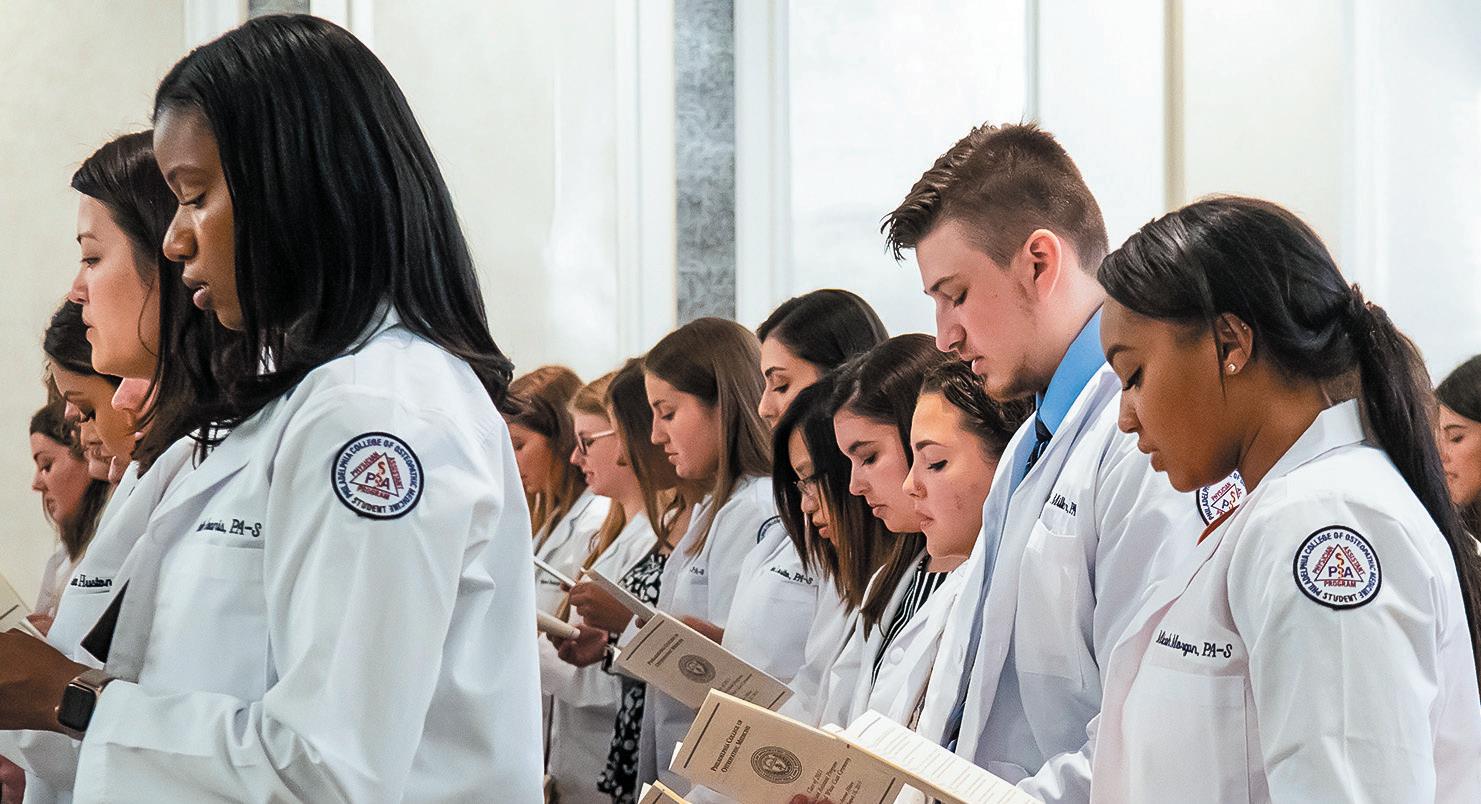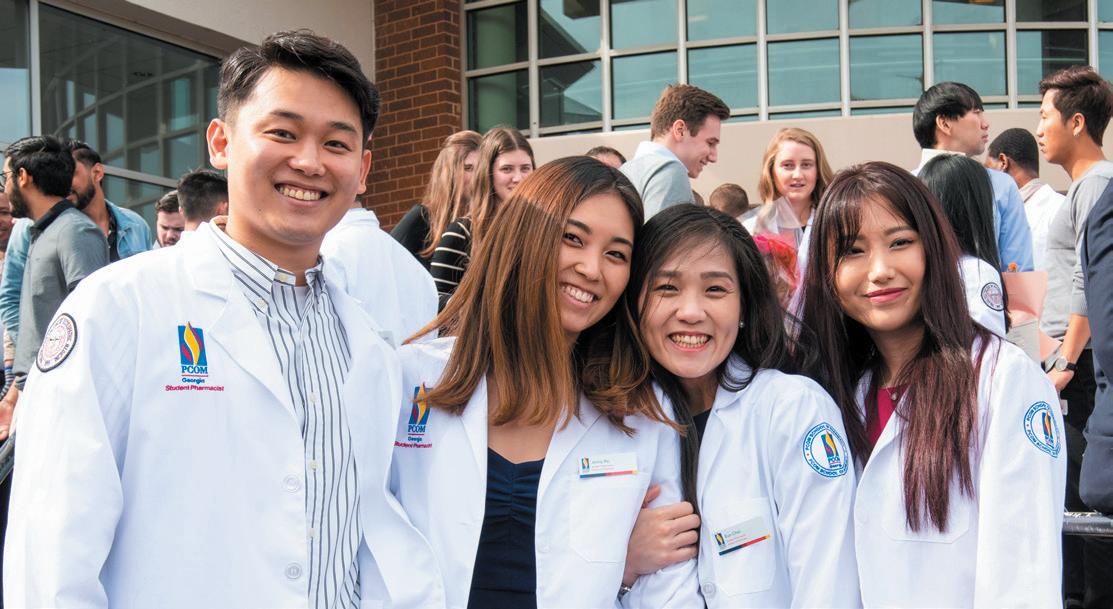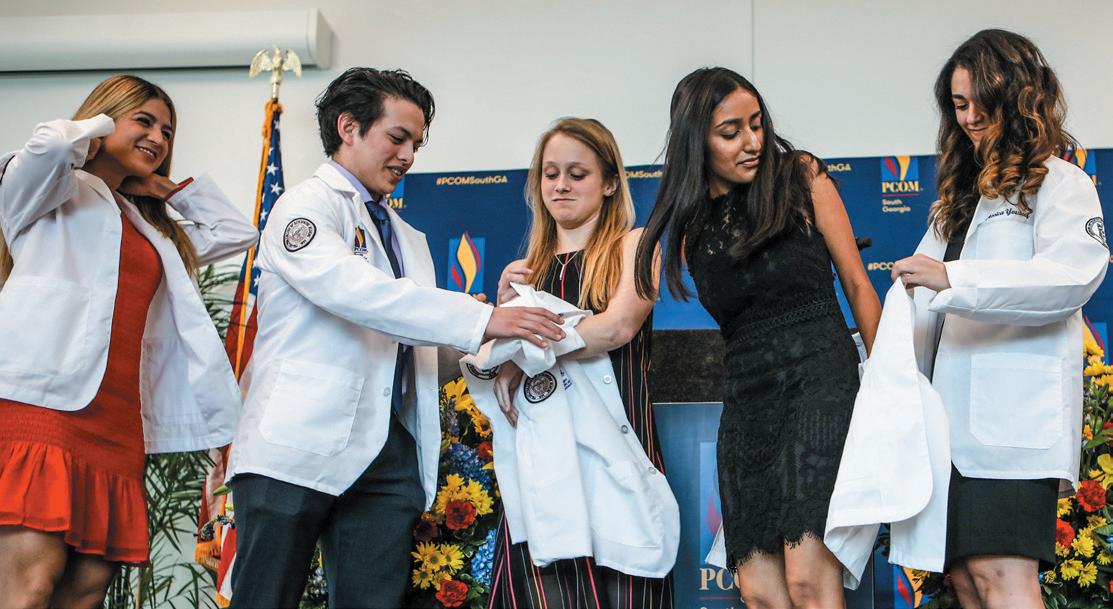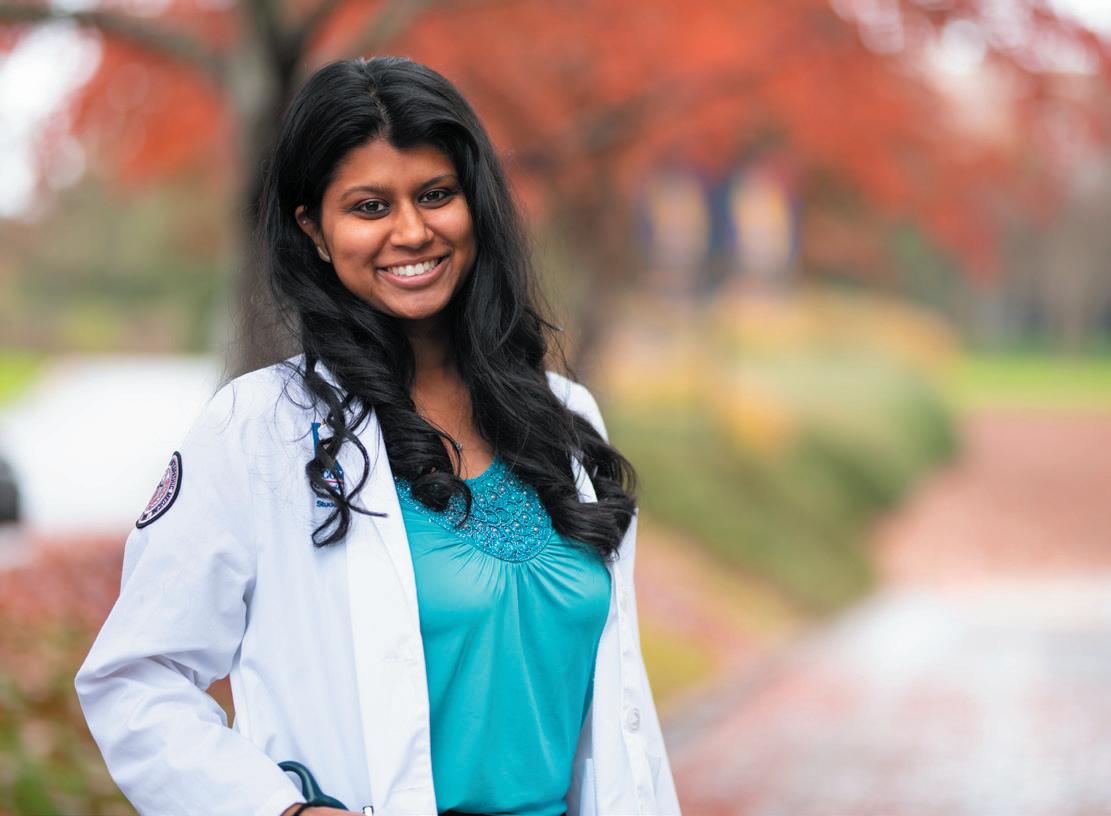
14 minute read
Updates
WHITE COAT SEASON
It was a significant rite of passage for PCOM’s DO, pharmacy, physical therapy and physician assistant studies students in August and October, as more than 670 participated in their programs’ respective White Coat ceremonies. At events at all three locations (including the inaugural DO White Coat Ceremony at PCOM South Georgia), students took their first steps toward becoming healthcare professionals.



THE POWER OF KINDNESS
This past fall, the Office of Student Affairs, the Mind and Body Club, and A Happier You, in conjunction with Kindness.org, hosted a “kindness exchange” on the Philadelphia campus. In Evans Hall, boards were set up so that students, faculty and staff could write kind thoughts on specially designed cards. They could then take another card or simply leave theirs for someone else. Research has shown that these “random acts of kindness” can have significant benefits for health, including reducing pain, stress, depression and anxiety.

TWO BOARD MEMBERS JOIN PCOM
The College recently appointed Timothy Burgess and Julie Fox to its Boards of Trustees. Mr. Burgess formerly served as the senior vice president for finance and administration at the University of Georgia and as the commissioner for the Georgia Department of Community Health. He also served as the director and state budget officer of the Governor’s Office of Planning and Budget for Georgia Governors Zell Miller and Roy Barnes. Ms. Fox is the market head of the Mid-Atlantic Private Wealth Market business for UBS, a global financial services firm which she has served for more than 17 years. “Mr. Burgess’ and Ms. Fox’s extensive experience in their fields, coupled with their drive to serve their communities, makes them excellent additions to our boards, and we are excited to have them join,” says Jay S. Feldstein, DO ’81, president and CEO.
PCOM WELLNESS FEST

This fall, the College celebrated its second annual Wellness Fest, title sponsored by Independence Blue Cross. Nearly 900 people were welcomed to the PCOM campus to participate in free health screenings, fitness classes, cooking demonstrations, wellness sessions, and kids’ activities. PCOM Wellness Fest was a perfect opportunity for the College to share its osteopathic philosophy of whole-person health with the local community. Proceeds raised benefit the PCOM Healthcare Centers and enable them to provide innovative programs and wellness groups focused on diabetes support, nutrition, medical yoga, exercise and stress management. Save the date for next year’s Wellness Fest to be held on September 26, 2020. General questions may be directed to wellnessfest@pcom.edu. Sponsorship inquiries may be directed to WFsponsorship@pcom.edu.
INTERNATIONAL RECOGNITION FOR PT PROFESSOR
A pair of shorts co-created by Ruth Maher, PT, PhD, DPT, professor, physical therapy, that are designed to help women suffering from stress urinary incontinence recently received the Innovation of the Year award from the Irish Times. Additionally, Atlantic Therapeutics—which produces the shorts and for which Dr. Maher serves as clinical advisor—was recognized as the European MedTech Company of the Year, and also received the License2Impact award for its collaboration with University College Dublin, Ireland, where Dr. Maher co-developed the shorts. Dr. Maher designed the prototype of what is now known as INNOVO using pelvic floor stimulating technology housed in customized shorts. The shorts, which come in a wide variety of sizes, enable the electrical stimulation to be spread over a wide area, increasing comfort. “The device replicates the brisk coordinated pelvic floor contraction that maintains continence during laughing, coughing, sneezing and exercise, thus preventing urinary leakage,” she says. “This coordinated contraction is vital to those suffering from stress urinary incontinence, maybe even more so than strength and endurance of the muscles.” Improvements continue to be made to the shorts, which, having gained FDA clearance, are now available over the counter. Data used to garner FDA clearance show that 80 percent of users saw significant improvement in symptoms after four weeks of use and 87 percent of users were dry or considered near-dry after three months of use. According to the World Health Organization, between 10 and 36 percent of individuals suffer from urinary incontinence, and the rate is twice as high in older women versus older men. Urinary incontinence can have a serious impact on quality of life, need for care and even mental health.

TEAMING UP FOR BETTER PATIENT CARE
The healthcare industry’s move toward a more collaborative, patient-centered approach to care is driving the trend of interprofessional education (IPE), which provides learning opportunities for students from across healthcare disciplines to learn from and alongside each other. Research has shown that better patient care results from healthcare professionals collaborating and communicating effectively. To that end, PCOM has partnered with the Villanova University M. Louise Fitzpatrick College of Nursing on a series of mockcode simulations, during which DO and PsyD students work Villanova University M. Louise Fitzpatrick College of Nursing

alongside students in Villanova’s graduate program in nursing anesthesia and undergraduate program in nursing to practice their respective roles while a “patient” experiences cardiopulmonary arrest due to missed medication. A simulated debrief, led by a PsyD student, follows the exercise. “PCOM was more than happy to collaborate with Villanova and its nursing students on this important initiative addressing a high-risk population, while also learning how to work together to put the patient’s needs first,” says Michael Becker, DO ’87, MS, assistant dean of clerkship education. “This person-centric thinking has been a main tenet of the osteopathic profession since its founding.” “Clinical psychologists are broadening their roles to be included as health service providers,” says Stephanie Felgoise, PhD, associate dean, academic integration, and Clinical PsyD program director. That program, she says, has “traditionally focused on holistic care alongside of the osteopathic medical school, and this new initiative further enhances the IPE at PCOM by having students learning from, with and about nurses’ education.” In addition to collaborating with Villanova, Dr. Becker notes, PCOM continues to explore ways to expand its own IPE offerings. “IPE is woven into the curricula of many of our academic programs, and working with Villanova provides our medical and psychology students with a unique, real-world opportunity to work alongside future nurses and nurse anesthetists,” he says. “That experience will be invaluable to all of the students once they begin clinical practice.”
STALKING KILLERS IN THE PAST

For Greg McDonald, DO ’89, dean of the School of Health Sciences, and director, forensic medicine, his relationship to crime in Philadelphia is familial; his maternal and paternal grandfathers both served at the city’s storied Eastern State Penitentiary—one as an inmate, the other as a guard—at the same time as notorious gangster Al Capone. Dr. McDonald would go on to serve as Philadelphia’s assistant medical examiner, using his medical knowledge to understand how people had died and, in some cases, help give them a voice when they could no longer speak. In a recent article on the news site Billy Penn, Dr. McDonald says he considers accurately identifying a cause of death a victory in his field, which can help restore justice and ease the healing process for loved ones. Over the years, he has helped identify plenty of murderers—even serial killers—in Philadelphia, all the while observing their impact on the field of medical examination. He recently took a reporter from Billy Penn on a tour of sorts, of true crime in Philadelphia: • Marie Noe was a Kensington woman whose 10 children all died, eight of the deaths being attributed to Sudden Infant Death Syndrome. When she eventually confessed to smothering her children, Dr. McDonald says, that changed the way medical examiners looked at childhood deaths. Now, if a cause can’t be immediately found, the cause is listed as “undetermined,” leaving the door open for future investigations. “If someone calls it undetermined at the beginning, it sends a red flag to other investigators who may be involved somewhere else,” Dr. McDonald says. • Gary Heidnik was a man in North Philadelphia who kidnapped and tortured eight women, killing two of them. He was finally apprehended when one of his victims was able to call 911. Dr. McDonald says this is a case that proves the need to take prior claims and criminal history seriously— Heidnik had previously been arrested several times. In so many cases, “there’s something leading up to the ultimate [killing],” says Dr. McDonald. “They don’t just wake up one day and say, ‘I’m going to do this.’ ” • Troy Graves perpetrated several rapes between 1997 and 1999 and came to be known as the “Center City rapist.” He murdered one woman, whose death Dr. McDonald calls especially tragic: A neighbor reported hearing sounds of a struggle and called the police. Arriving at the scene, they knocked at the door, didn’t hear anything and left. “He was in the process of strangling her, and they didn’t break down the door,” Dr. McDonald says. • Antonio Rodriguez, dubbed the “Kensington Strangler,” struck in 2010, killing three women in just two months. At first, his defense was that the strangulations happened by accident; however, that was quickly debunked. Dr. McDonald says it can take several minutes for someone to die in this manner. “So for someone to say, ‘I didn’t mean to do it,’ that doesn’t fly.”
* Parts of this story were reprinted with permission from Billy Penn. Read the full story at bit.ly/PhillyTrueCrime.
BEHAVIORAL STRATEGIES FOR FIGHTING AN EPIDEMIC
Researchers David Festinger, PhD, director of substance abuse research and education at PCOM, and Michelle Lent, PhD, associate professor, clinical psychology, were awarded a $5.5 million contract from the Patient-Centered Outcomes Research Institute to study the effectiveness of psychosocial treatments for individuals receiving medication-assisted treatment (MAT) for opioid use disorder. The study will examine the effectiveness of cognitive behavioral therapy (CBT) and peer recovery support individually and in combination. While these have shown promise in treating addictive disorders, they have not been extensively studied in conjunction with MAT, says Dr. Festinger. “Moreover, there is no one-size-fits-all approach to treating opioid addiction, just as there is no one-size-fits-all approach to treating any other disease,” he says. “This study will help to determine which psychosocial approach works best for different types of patients, allowing us to tailor treatment more effectively.” The project will follow 440 patients receiving buprenorphine/ naloxone, randomized into one of four conditions: (1) medication alone, (2) medication with CBT, (3) medication with peer support, or (4) medication with CBT and peer support. Study outcomes will include opioid abstinence, treatment retention, quality of life and emergency hospitalizations. “This program of research will examine the utility of a multidisciplinary approach to treating this major public health crisis,” says Dr. Lent. “We are finding that even the most promising pharmaceutical treatments benefit from behavioral strategies to promote adherence and sustain positive health outcomes.” The study, expected to begin enrollment in spring 2020, was selected through a highly competitive review process in which patients, caregivers and other stakeholders joined scientists to evaluate the proposals.
SAVING STUDENT PHARMACISTS TIME AND MONEY
The PCOM School of Pharmacy recently signed articulation agreements with four University System of Georgia colleges and universities. Students from Abraham Baldwin Agricultural College in Tifton, Georgia Gwinnett College in Lawrenceville, Middle Georgia State University in Macon, and Valdosta State University in Valdosta will benefit. Those eligible will enter pharmacy school after completing their junior year of college and will have the opportunity to earn their bachelor’s and doctorate degrees while at PCOM Georgia. By finishing their education a year early, students will be able to achieve their career goals more quickly and affordably, says Shawn Spencer, PhD, RPh, dean of the PCOM School of Pharmacy. “Our articulation agreements exemplify how the PCOM School of Pharmacy is working hard to help our students achieve their goals of becoming pharmacists. We applaud these institutions for partnering with us as we support Georgia students who wish to enter the healthcare workforce,” Dr. Spencer says. In addition, students enrolled in the Doctor of Pharmacy program at PCOM Georgia have the option of enhancing their credentials by pursuing concentrations in the pharmacy practice areas of acute, ambulatory and managed care. Students may also pursue one of three graduate business programs offered in partnership with Saint Joseph’s University in Philadelphia.
PAVING THE WAY IN STEM
During summer 2019, researchers at PCOM opened up their labs to undergraduate students at Cabrini University as part of a summer mentoring program designed to educate college-age African American and Latino men about the process of research and what it’s like to work in a professional laboratory. For eight weeks, the Cabrini students served as integral parts of the researchers’ teams, learning how to formulate research hypotheses, design experiments and interpret their findings. Lack of diversity in the science, technology, engineering and mathematics (STEM) fields persists. A 2018 study by the Pew Research Center found that African Americans and Latinos make up just 11 percent and 8 percent, respectively, of health-related fields. In the life sciences, those numbers drop to 4 percent and 7 percent. Mark Martin, a biology student at Cabrini who worked alongside Jacquelyn Gerhart, MS, coordinator of PCOM’s research support staff and bio-imaging facility, says he was excited by the opportunity to work in a functioning lab and found the experience beneficial. “Jackie not only taught me how to do research but also helped me learn how to market myself so that I can have a better chance of getting a job,” says Mr. Martin. “She was an amazing mentor and made this experience truly memorable for me.” “There is a real, noticeable absence of black and Latino men in the STEM fields, particularly in the basic sciences, and we want to do everything we can to address that gap by breaking down barriers and showing these men that there are viable careers in these fields for them,” notes Marcine Pickron-Davis, PhD, chief diversity and community relations officer at PCOM.
MEDICAL SIMULATION ASSUMES A FRONT ROW SEAT IN TRAINING STUDENTS
At PCOM, students enrolled in the Biomedical Sciences program can now take part in a new Medical Simulation concentration, which teaches students how to manage and effectively run a simulation center. As part of the program, students train in basic life support and advanced cardiac life support, complete emergency medical technician (EMT) training, and have the opportunity to run more than 2,000 simulations in the College’s simulation centers in Philadelphia and Suwanee. In addition, a certificate of graduate study and a certificate of advanced graduate study in Medical Simulation are offered, with plans to add a master’s degree in Medical Simulation to PCOM’s academic programs. In August, PCOM Georgia unveiled its Mobile Medical Simulation Lab, an ambulance-like vehicle through which emergency simulations are run to train PCOM students and paramedics, EMTs and other healthcare professionals across the state. James Hogue, DO, clinical assistant professor, emergency medicine and faculty advisor to the Emergency Medicine Club, says, “Having our own ambulance allows us many opportunities to get a sense of how pre-hospital care operates.” Additionally, DO students at PCOM Georgia participate in “Sim Battles,” which provide fun and unique learning opportunities. Teams of six individuals are presented with trauma cases and work together to save the lives of patients—represented by lifelike mannequins or standardized patients. The winners participate in PCOM Georgia’s annual Trauma Day, during which DO students work with EMT, nursing and other student healthcare professionals on customized clinical scenarios.

PCOM GEORGIA STUDENT NAMED STATE’S MEDICAL STUDENT OF THE YEAR
Akila Raja (DO ’21) was named the Medical Association of Georgia (MAG) Student of the Year. Each year, the award is presented to one student enrolled in Georgia’s medical schools. The association honors students, residents and faculty who practice patient-centered care and exhibit compassion, integrity, excellence and empathy. “We were deeply impressed by your dedication to your community. You are collaborative, thoughtful and selfless in your endeavors,” said MAG’s Renai Lilly, manager, membership outreach and meeting planning. At PCOM Georgia, Ms. Raja organized a Road to Recovery panel, through which students and faculty discussed the struggles of dealing with addiction. She also worked to bring a chapter of the Gold Humanism Honor Society to the Suwanee campus. “Any project or program I did over the past few years served as a constant reminder as to why I want to become a physician and of the impact I want to make in my community and career,” said Ms. Raja.

FOUNDERS DAY 2020 by David McKay Wilson ’





